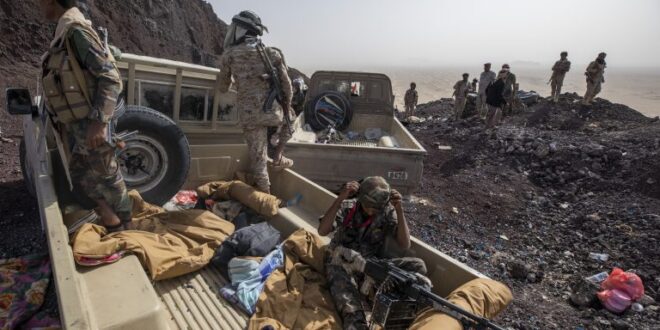Fighting intensified this week in the strategically important city of Marib in central Yemen, believed to be a key access point to the northern part of the country.
U.S. National Security Advisor Jake Sullivan traveled to the Middle East earlier this week, meeting with Saudi Crown Prince Mohammed bin Salman.
After suffering a series of foreign policy setbacks, the Biden administration is looking for a “win,” and intensifying diplomatic engagement related to the conflict in Yemen remains a top priority.
While the Biden administration has so far taken a tougher stance with the Saudis than the Trump administration, it remains unclear whether Washington can convince Riyadh to end its disastrous involvement in Yemen.
Fighting intensified this week in the strategically important city of Marib in central Yemen, believed to be a key access point to the northern part of the country. Dozens were killed on Monday, as Iran-backed Houthi rebels clashed with pro-government troops. The Saudi-led coalition responded with airstrikes, not only in the oil-rich province of Marib, but also in Shabwa. The airstrikes targeted Houthi vehicles and other logistical hubs. Hundreds have been killed this month alone, while tens of thousands have been killed and millions displaced since the war began seven years ago; the shadow of famine looms over an estimated 16.2 million people this year. Despite being nearly forgotten about, the United Nations has labeled it the world’s worst humanitarian crisis, with more than eighty percent of Yemen’s 30 million in need of assistance. In addition to poverty and starvation, Yemen is also still plagued by the presence of terrorist groups like al-Qaeda in the Arabian Peninsula (AQAP) and the Islamic State in Yemen (ISY), both hampered by ongoing counterterrorism operations but looking for an opportunity to resurge as conditions on the ground become more favorable. Still, news about the conflict seems largely absent from the headlines in Western media.
The Houthis have been making a push to seize Marib, looking to gain control over critical energy resources, perhaps in an attempt to gain leverage in future negotiations. Envoys from both the United Nations and the United States have been attempting to resuscitate stalled peace talks, but with little success. U.S. National Security Advisor Jake Sullivan traveled to the Middle East earlier this week, meeting with Saudi Crown Prince Mohammed bin Salman (MBS). The U.S. delegation also included Tim Lenderking, special envoy for Yemen; Brett McGurk, the Biden administration’s Middle East and North Africa coordinator; and Martina Strong, the top U.S. diplomat in Saudi Arabia. Reports of the meeting said the discussion focused on ending the war in Yemen, deescalating regional tensions with Iran, and Saudi Arabia’s dismal human rights record. Sullivan also met with Deputy Defense Minister Khalid bin Salman, Interior Minister Abdulaziz bin Saud bin Nayef, and National Guard Minister Abdullah bin Bandar. Lenderking has been critical of the Houthis, commenting in July that they “refuse to engage meaningfully on a cease-fire and political talks.”
After suffering a series of foreign policy setbacks, the Biden administration is looking for a “win,” and intensifying diplomatic engagement related to the conflict in Yemen remains a top priority. Many are doubtful, however, of Riyadh’s willingness to wind down the conflict, especially when it has little to show at this time for its ongoing involvement. The war has devastated Yemen’s economy and led to critical and overlapping humanitarian crises. Saudi airstrikes have exacerbated the suffering, leading to civilian deaths, while embargoes have compounded the country’s ongoing famine. UN Special Envoy to Yemen Hans Grundberg implored all sides involved to devote the time and energy necessary for negotiations to make progress.
The centerpiece of President Joe Biden’s foreign policy is supposed to be human rights, and this was the highest profile visit of a U.S. delegation from the current administration, owing largely to the role of Bin Salman in the brutal murder of journalist Jamal Khashoggi in October 2018. And while the Biden administration has so far taken a tougher stance with the Saudis than the Trump administration, which largely allowed MBS to operate with a blank check, it remains to be seen if Washington will be able to successfully convince Riyadh to end its disastrous involvement in Yemen and move toward a political settlement. Last week, the U.S. House of Representatives adopted a provision to end logistical support to Saudi war planes operating in Yemen, while also pushing to end the U.S. role in providing intelligence to the Saudis related to airstrikes.
 Eurasia Press & News
Eurasia Press & News




